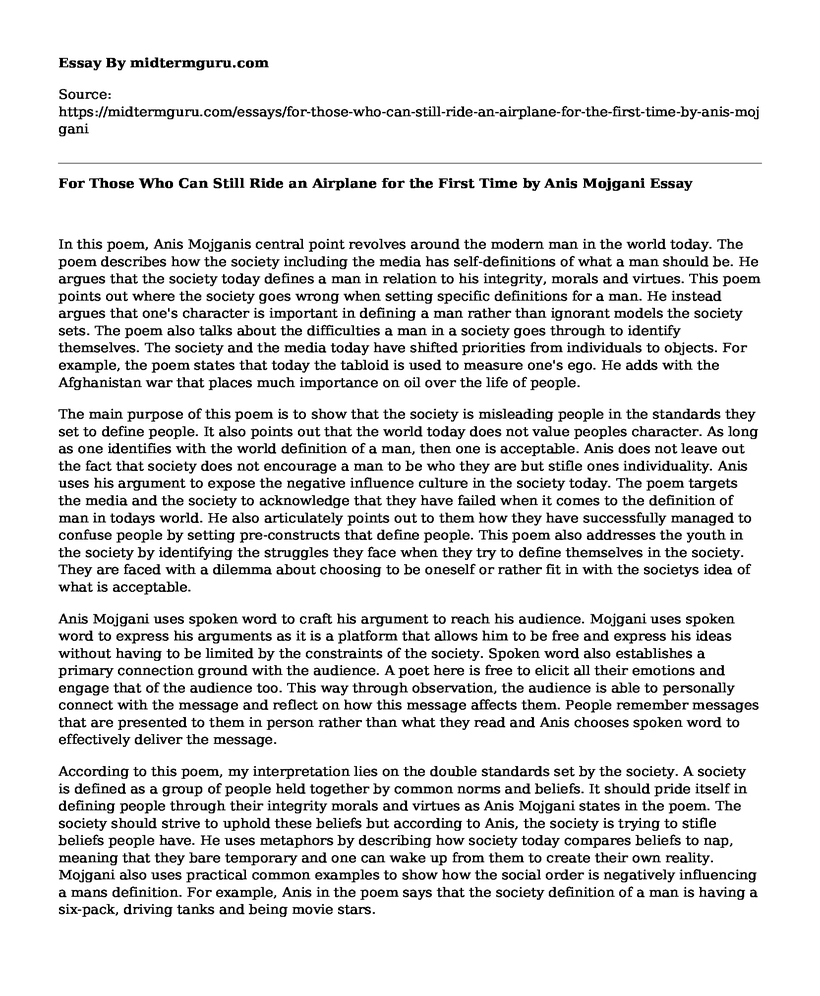In this poem, Anis Mojganis central point revolves around the modern man in the world today. The poem describes how the society including the media has self-definitions of what a man should be. He argues that the society today defines a man in relation to his integrity, morals and virtues. This poem points out where the society goes wrong when setting specific definitions for a man. He instead argues that one's character is important in defining a man rather than ignorant models the society sets. The poem also talks about the difficulties a man in a society goes through to identify themselves. The society and the media today have shifted priorities from individuals to objects. For example, the poem states that today the tabloid is used to measure one's ego. He adds with the Afghanistan war that places much importance on oil over the life of people.
The main purpose of this poem is to show that the society is misleading people in the standards they set to define people. It also points out that the world today does not value peoples character. As long as one identifies with the world definition of a man, then one is acceptable. Anis does not leave out the fact that society does not encourage a man to be who they are but stifle ones individuality. Anis uses his argument to expose the negative influence culture in the society today. The poem targets the media and the society to acknowledge that they have failed when it comes to the definition of man in todays world. He also articulately points out to them how they have successfully managed to confuse people by setting pre-constructs that define people. This poem also addresses the youth in the society by identifying the struggles they face when they try to define themselves in the society. They are faced with a dilemma about choosing to be oneself or rather fit in with the societys idea of what is acceptable.
Anis Mojgani uses spoken word to craft his argument to reach his audience. Mojgani uses spoken word to express his arguments as it is a platform that allows him to be free and express his ideas without having to be limited by the constraints of the society. Spoken word also establishes a primary connection ground with the audience. A poet here is free to elicit all their emotions and engage that of the audience too. This way through observation, the audience is able to personally connect with the message and reflect on how this message affects them. People remember messages that are presented to them in person rather than what they read and Anis chooses spoken word to effectively deliver the message.
According to this poem, my interpretation lies on the double standards set by the society. A society is defined as a group of people held together by common norms and beliefs. It should pride itself in defining people through their integrity morals and virtues as Anis Mojgani states in the poem. The society should strive to uphold these beliefs but according to Anis, the society is trying to stifle beliefs people have. He uses metaphors by describing how society today compares beliefs to nap, meaning that they bare temporary and one can wake up from them to create their own reality. Mojgani also uses practical common examples to show how the social order is negatively influencing a mans definition. For example, Anis in the poem says that the society definition of a man is having a six-pack, driving tanks and being movie stars.
In his performance, Anis constantly uses repetition of the phrase what a man means to bring out his main point. This phrase helps me come to this interpretation. He uses this phrase to draw attention to the differences between his understanding of a man and that presented to him by the society. The poem encompasses personal experiences that seek to empathize with that of the audience. For example, he starts the poem by saying that he is thirty years old and but still struggles to figure out what being a man means. He goes on to remember his childhood days what wanted to be when he grew up but now that he is grown he has not achieved his dreams. In addition, he is still in a dilemma of what he is supposed to embrace as a definition for himself, he wonders if he should accept what the society wants him to be or to carry on with his childhood beliefs about the definition of a man. All these instances in the poem helped me come with the interpretation of the society having a negative influence on beliefs and definitions of what being a man is all about.
Works Cited
BIBLIOGRAPHY For Those Who Can Still Ride In Airplanes for The First Time. Dir. Slam Nationals. Perf. Anis Mojgani. 2005.
Genius. For Those Who Can Still Ride In An Airplane For The First Time (aka Quentin). 3 September 2007. 1 February 2017 <https://genius.com/Anis-mojgani-for-those-who-can-still-ride-in-an-airplane-for-the-first-time-aka-quentin-annotated>.
Cite this page
For Those Who Can Still Ride an Airplane for the First Time by Anis Mojgani. (2021, Jun 01). Retrieved from https://midtermguru.com/essays/for-those-who-can-still-ride-an-airplane-for-the-first-time-by-anis-mojgani
If you are the original author of this essay and no longer wish to have it published on the midtermguru.com website, please click below to request its removal:
- Theme of Disillusionment in the Invisible Man by Ralph Ellison
- Quotes From the Time Machine by H. G. Wells Analysis - Literature Paper Example
- Literature Essay on Iago Relationship With Othello
- Free Soil, Free Labor, Free Men Book Analysis Essay
- Literary Analysis Essay on Theme of Struggling and Suffering in Poetry: Maya Angelou and Langston Hughes
- Literary Analysis Essay on Beowulf's Teachings
- Perception of Social Issues: A Philosophical Analysis - Essay Sample







